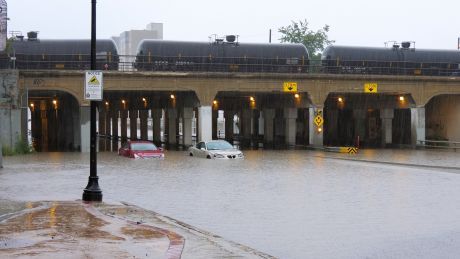News
You are here
Capitalism is a climate disaster

September 5, 2014
This summer has seen increasingly extreme weather globally, much higher food prices, and extreme distress for many around the world. As always, those least responsible for climate change are most effected by climate disasters.
The urgency about climate change isn’t likely lost on anyone reading this, but in the lead up to the People’s Climate March in New York City September 21, here’s a brief overview:
A warming planet
According to the National Climatic Data Center in the US, the average global temperature in July made it the fourth hottest July since we've started keeping records in the 1800s. July was also the 38th consecutive July and the 353rd consecutive month where the global average temperature was greater than the 20th century average for that month. If you were born after the middle of 1985 you have never experienced an average global monthly temperature; your entire life has been on a planet unnaturally warmed by capitalism's excesses.
Typhoons and hurricanes
Originally estimated to be a super typhoon and the strongest winds to ever hit Japan, Neoguri was downgraded to a typhoon prior to landfall in early July. This typhoon held the attention of Japan’s capitalist elite in a tight grip: refiner companies, offshore drilling operations and nuclear reactors were shut down. Japan Airlines and All Nippon Airways cancelled 40 flights collectively, affecting more than 2000 travellers. Officials urged nearly 90,000 residents to evacuate Kyushu and 580,000 in 18 municipalities in Okinawa Prefecture. After the typhoon a heat wave across Japan killed one person and sent 152 to hospital.
Fortunately the worst tropical storm this summer did not hit land. Starting in the Eastern pacific Hurricane Genevieve later crossed the international date to become Typhoon Genevieve. It created peak winds of 260 km/h.
Flooding
Farm lobby group Keystone Agricultural Producers (KAP) estimate this July’s flood will cost Manitoba farmers $1 billion. Due to flooding, two million acres are unseeded or lost to water damage due to the floods, and that number was expected to rise to 3.5 million (25% of arable land). The Rural Municipality of Edwards, in Southwestern Manitoba, declared a state of emergency June 30, before 200 millimetres of rain fell; the oil industry is feeling the pain of closed roads, and waiting for repair work to be done yet again. Road repairs are expected to cost $4million this year alone. Then in August, parts of Winnipeg flooded after 75 mm of rain fell in one afternoon.
Forest fires
In the Northwest Territories thousands of hectares of forest are consumed by natural fires every year, but this year bears witness to the worst fires since the 1990’s, due largely to sparse precipitation, temperatures well above historic averages and warm dry air drying out the forest - causing flames to spread faster and further.
Earlier this year, California, Arizona and Alaska all dealt with severe wildfires. Regarding massive forest fires in Washington State in July (and the largest the State has ever seen), Obama stated on July 22, “A lot of it has to do with drought, a lot of it has to do with changing precipitation patterns and a lot of that has to do with climate change.” That might qualify as the most carefully crafted statement of the year. Obama asked Congress for $615 million in emergency spending to battle the Washington wildfires.
Drought
California is currently in its third year of drought – its’ worst drought in over a century, with 82 per cent of the state facing extreme or exceptional drought - and researchers at the University of California, Davis estimate the cost will be billions of dollars and thousands of jobs lost. Lake Oroville, the state’s second largest reservoir, is at 32% capacity. California’s farmers are having to drill deeper into the aquifers for water, and it can take decades for the rain to replenish those.
System change not climate change
Climate change is not natural, nor is it an inevitable result of human interaction with the earth. Rather, it is a reflection of our current profit-driven economic system, based on infinite growth on a finite planet. The effects of climate change are now occurring daily, disproportionately affecting poor and oppressed communities.
This makes it all the more urgent that we create a movement that can support communities resisting extractive industries like tar sands and fracking, and connected to the immediate demand of climate job alternatives. In BC, Unifor (the union representing tar sands workers) has signed the Solidarity Accord giving solidarity to Indigenous communities resisting the Northern Gateway pipeline. In New York, the Peoples Climate March will see thousands of people--including Indigenous, environmental and labour activists--marching for climate justice.
We also have to connect these mass movements to the need to overturn the capitalist system that has brought us to this state. We need to challenge corporations and their states, and create a world based on human and environmental need. The only alternative to climate change is a radical and democratic system change
Join the discussion "System change not climate change", Tuesday September 16, 6pm at Trinity St Paul Centre (427 Bloor St West, Toronto), where you can pick up a copy of the new climate justice pamphlet.
Section:
Topics:










